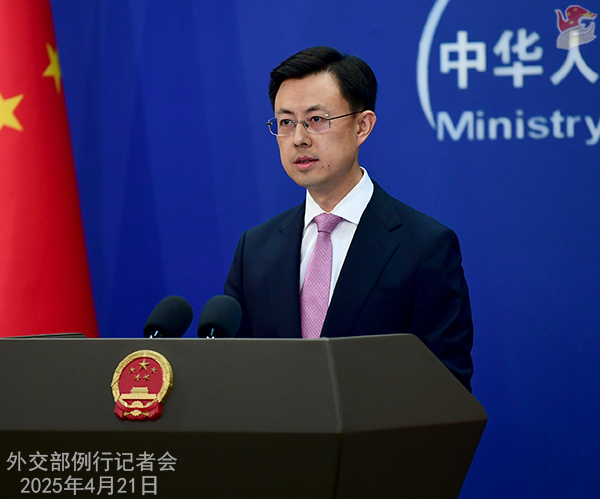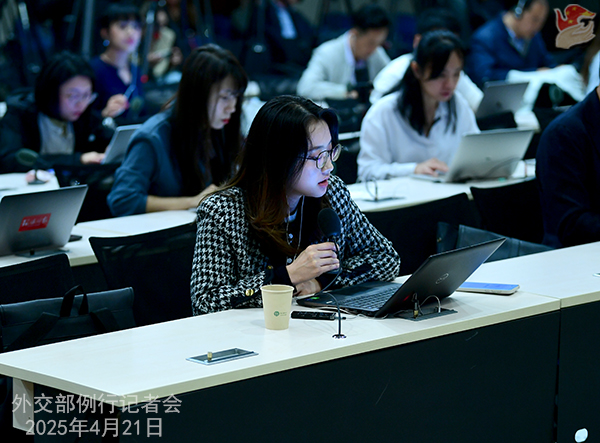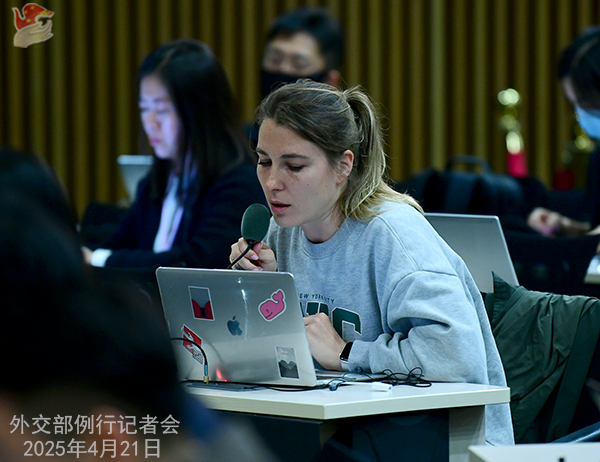
People’s Republic of China


CCTV: This morning China announced that President of Azerbaijan Ilham Aliyev will pay a state visit to China. Can you share the background, arrangement and China’s expectation for the visit?
Guo Jiakun: China and Azerbaijan are strategic partners. Over recent years, under the personal care and effort of the two presidents, China-Azerbaijan relations have maintained a sound growth momentum, with deepening political mutual trust, fruitful Belt and Road cooperation, and effective international coordination. During the visit, President Xi Jinping will hold talks with President Ilham Aliyev to draw a new blueprint for the growth of bilateral relations. Premier Li Qiang and Chairman of the NPC Standing Committee Zhao Leji will meet with him respectively to have in-depth exchanges of views on cooperation in various areas. We believe that this visit will further deepen the strategic partnership between the two countries and bring more benefit to the two peoples.
RIA Novosti: Russian President Putin said on April 19 that Russian military forces would stop all military activity from April 19 to 21 with the arrival of Easter. What is China’s comment on this?
Guo Jiakun: We noted relevant reports. China is happy to see any effort for a ceasefire, which is necessary for realizing peace. We hope relevant parties will continue to resolve the crisis through dialogue and negotiation.
China Daily: The U.S. announced sanctions on several officials of the Chinese central government’s agency in the Hong Kong SAR and the government of the Hong Kong SAR. Will China take countermeasures?
Guo Jiakun: The U.S.’s illegal unilateral sanctions on six officials of the Chinese central government’s agency in the Hong Kong SAR and the government of the Hong Kong SAR are a severe interference in China’s domestic affairs, including Hong Kong affairs, and a violation of principles of international law and basic norms governing international relations. China strongly condemns this despicable move. In accordance with the Anti-Foreign Sanctions Law of the People’s Republic of China, China decided to sanction the U.S. congressional members, officials and heads of NGO who have acted egregiously on the Hong Kong-related issues.
Our message to the U.S.: Hong Kong is China’s Hong Kong and Hong Kong affairs brook no U.S. interference. The U.S.’s erroneous practice on the Hong Kong-related issues will for sure meet China’s resolute response and reciprocal countermeasures.
AFP: Gunman in Chile on Sunday attacked a Chinese-owned hydroelectric plant under construction, setting fire to dozens of trucks and heavy equipment. Does the Foreign Ministry have a comment on this?
Guo Jiakun: China strongly condemns the attack. We have asked relevant authorities of Chile to take effective measures to protect the security and safety of projects and personnel of Chinese companies. We stand ready to work closely with Chile in the investigation of the case and handling of related work.
Xinhua News Agency: Brice Clotaire Oligui Nguema, Gabon’s interim president, won the first presidential election with 94.85 percent of the vote, according to the provisional results recently announced by Gabon’s National Election and Referendum Organization and Coordination Committee. What’s China’s comment and expectation of its relations with Gabon?
Guo Jiakun: China congratulates Gabon on its smooth presidential election. President Xi Jinping sent a congratulatory message to Mr. Nguema. China and Gabon are traditional friends and comprehensive strategic cooperative partners. China attaches great importance to its relations with Gabon. We stand ready to work with Gabon to carry forward our traditional friendship, deliver the outcomes of the Beijing Summit of the Forum on China-Africa Cooperation, deepen exchanges and cooperation in various fields, and add new substances to the China-Gabon comprehensive strategic cooperative partnership so as to deliver greater benefits to the two peoples.

News 1 Korea: Latest satellite photos show that China installed a large steel platform, which features a helipad, in the provisional measures zone between China and the ROK in the Yellow Sea. In the past, China also installed deep-sea aquaculture facilities. This has caused concern from the ROK government. What is China’s comment?
Guo Jiakun: My colleague has made clear China’s position. Let me reiterate that China and the ROK have overlapping claims on maritime rights and interests. The two sides are advancing negotiations on maritime delimitation and in the meanwhile, actively carrying out cooperation in the provisional measures zone (PMZ) in accordance with the China-ROK Fishery Agreement. The aquaculture facilities set up by Chinese company in the PMZ do not contravene the agreement between China and the ROK. China has shared relevant information and maintained communication with the ROK through channels such as the dialogue and cooperation mechanism of maritime affairs. We hope the ROK will view this in an objective and reasonable manner.
Bloomberg: The U.S. and the Philippines will start their flagship annual military drills today. The exercise has come as Beijing and Manila are obviously in a dispute over the South China Sea. A Philippine general who directed drills said Manila is treating them as an exercise “for our defense.” Would the Ministry like to respond on that?
Guo Jiakun: With the world being hit by unilateralism, protectionism and bullying, countries in this region have been calling for greater solidarity, coordination, and joint efforts to keep the region stable and respond to challenges. Against this backdrop, the Philippines chose to conduct the large-scale military drills with this country outside the region and brought in strategic and tactical weapons to the detriment of regional strategic stability and regional economic prospects, which puts them on the opposite side of regional countries. This act has been detested and opposed by regional countries.
The Taiwan question is purely China’s internal affair and is at the core of China’s core interest. China firmly opposes any country using the Taiwan question as an excuse to strengthen military deployment in the region, heighten tensions and confrontation, and disturb regional peace and stability. We urge relevant sides not to make provocation on the Taiwan question. Those who play with fire will perish by it.
AFP: We are seeing reports that the Iranian Foreign Minister Araghchi will visit China. Can the Foreign Ministry confirm this?
Guo Jiakun: China and Iran maintain exchanges and interactions at various levels and in multiple fields. On the specific visit that you mentioned, I have no information to share at the moment.
AFP: Protesters in the West African country of Guinea-Bissau on Sunday attacked a Chinese-run mining site in the northwest of the country and set fire to equipment. Does the Foreign Ministry have a comment on this?
Guo Jiakun: I’m not aware of the specifics that you mentioned. Let me reaffirm that the Chinese government keeps asking Chinese companies to abide by local laws and policies and lawfully do their business overseas.
AFP: I have a question about Myanmar. We are seeing reports that this week, the Myanmar National Democratic Alliance army will hand control of the strategic town of Lashio back to the Myanmar junta forces. The consensus is that the deal has been brokered under pressure from China. Does the Foreign Ministry have a comment on this?
Guo Jiakun: China and Myanmar are friendly neighbors. China’s position on the Myanmar issue is very clear. We follow the principle of non-interference in other countries’ internal affairs, support Myanmar in safeguarding independence, sovereignty, national unity and territorial integrity, support various parties in Myanmar in carrying out friendly consultation toward political reconciliation, and support Myanmar in resuming the political transition process.
***************************
The following question was raised after the press conference: In the turbulent global security situation, the world is at risk of reverting to the law of the jungle. On April 21, 2022, President Xi Jinping put forward the Global Security Initiative, offering a Chinese proposal for addressing security challenges and safeguarding and promoting world peace. Today marks the third anniversary of the initiative. Could you share with us the positive role of this initiative in safeguarding and promoting world peace and security?
Guo Jiakun: Three years ago today, President Xi Jinping, for the future and welfare of humanity, put forward the Global Security Initiative (GSI). Over the past three years, with his personal guidance, China, in line with the vision of building a community with a shared future for mankind, has been working with the rest of the world to fully advance the GSI, and made important progress.
The GSI has gained the support of over 120 countries and regional and international organizations. It has been written into over 120 bilateral and multilateral documents between China and other countries or international organizations. Cooperation in various fields under the GSI framework has made steady progress and produced initial results.
Under the GSI, China firmly supports developing countries in Asia, Africa, Latin America and other regions in safeguarding their own sovereignty, security, and development interests. China has signed MOUs on GSI cooperation with some Asian and African countries and trained various talents of security governance for developing countries to help grow the strength of the Global South in safeguarding peace and security.
China makes full use of its role as the permanent member of the UN Security Council. China issued position papers on the Ukraine crisis, the Palestinian-Israeli conflict and the Afghanistan issue, among others, launched the Group of Friends for Peace on the Ukraine crisis together with Brazil and other Global South countries, facilitated the reconciliation between Saudi Arabia and Iran, promoted the internal reconciliation within Palestine, and provided viable solutions to solving disputes and differences, and managing risks and crisis.
China actively addresses non-traditional security risks. China has fully implemented the UN Global Counter-Terrorism Strategy, improved rules of governance on new frontiers such as the deep sea, polar regions, outer space, artificial intelligence, data and the Internet, and conducted international cooperation in such fields as climate change, energy security, food security, and combating cross-border crimes, online gambling and scam.
This year marks the 80th anniversary of the victory in the World Anti-Fascist War and of the founding of the UN. The history of humanity is arriving at yet another crucial juncture. China stands ready to work with other parties to steer the trend of history, uphold the right path of common security, continue to advance the GSI, and strive for a world that enjoys lasting peace and universal security.




